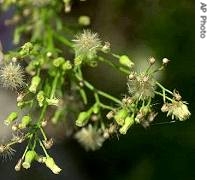-
(单词翻译:双击或拖选)
By Jessica Berman
Washington
05 October 2006
U.S. researchers have developed a vaccine1 that offers protection against a common allergy2 trigger in the United States known as ragweed. Scientists say the development has the potential to guard against any number of inflammatory diseases.
----
 Ragweed plant |
||
Hay fever produces sneezing, an itchy, runny nose and watery4 eyes. The problem is worst in the eastern and midwestern United States. The symptoms are triggered by pollen5 from the yellow flowering ragweed.
The allergic sufferer, according to expert Peter Creticos, produces too much of an antibody called I.g.E. This triggers an excessive immune response to otherwise harmless substances such as pollen.
"The question is, 'Can you turn off that I.g.E.-mediated allergic process?' With traditional immuno-therapy, you can accomplish that. But it takes years and years," he said.
That would be an average of four to five years of going to an allergist for weekly injections to become fully6 immune to the ravages7 of ragweed pollen.
But Creticos, an associate professor of medicine at Johns Hopkins University in the eastern U.S. state of Maryland, and colleagues have conducted trials of an experimental vaccine that achieves the same level of protection in just six injections.
In a study published in the New England Journal of Medicine, a team led by Creticos reports the vaccine virtually eliminated ragweed symptoms in 14 severely8 affected9 individuals between the ages of 23 and 60.
The drug, administered in six weekly shots before the 2001 ragweed season, protected the study participants that year and through the 2002 ragweed season.
Investigators10 do not know yet whether the vaccine will offer protection beyond two years, but they think it will.
The vaccine was developed by Dynavax Technologies of Berkeley, California, which funded the clinical trials.
Co-author David Broide of the University of California in San Diego says the drug acts as a decoy to deceive the immune system of allergy sufferers.
"Bacteria activate11 a protective-host immune response. And we have taken advantage of this by tagging the allergen with this little piece of bacterial12 DNA13, which is not infectious, and which results in the immune system being fooled into thinking that they are seeing a bacteria instead of an allergen," he said. "And they do not bring up the allergic immune response."
Broide says the vaccine will not be available for at least another two years.
In time, researchers hope to use the DNA technology to create vaccines14 against grass pollen, cat dander and dust, as well as more serious diseases such as hepatitis.
 收听单词发音
收听单词发音
1
vaccine

|
|
| n.牛痘苗,疫苗;adj.牛痘的,疫苗的 | |
参考例句: |
|
|
|
2
allergy

|
|
| n.(因食物、药物等而引起的)过敏症 | |
参考例句: |
|
|
|
3
allergic

|
|
| adj.过敏的,变态的 | |
参考例句: |
|
|
|
4
watery

|
|
| adj.有水的,水汪汪的;湿的,湿润的 | |
参考例句: |
|
|
|
5
pollen

|
|
| n.[植]花粉 | |
参考例句: |
|
|
|
6
fully

|
|
| adv.完全地,全部地,彻底地;充分地 | |
参考例句: |
|
|
|
7
ravages

|
|
| 劫掠后的残迹,破坏的结果,毁坏后的残迹 | |
参考例句: |
|
|
|
8
severely

|
|
| adv.严格地;严厉地;非常恶劣地 | |
参考例句: |
|
|
|
9
affected

|
|
| adj.不自然的,假装的 | |
参考例句: |
|
|
|
10
investigators

|
|
| n.调查者,审查者( investigator的名词复数 ) | |
参考例句: |
|
|
|
11
activate

|
|
| vt.使活动起来,使开始起作用 | |
参考例句: |
|
|
|
12
bacterial

|
|
| a.细菌的 | |
参考例句: |
|
|
|
13
DNA

|
|
| (缩)deoxyribonucleic acid 脱氧核糖核酸 | |
参考例句: |
|
|
|
14
vaccines

|
|
| 疫苗,痘苗( vaccine的名词复数 ) | |
参考例句: |
|
|
|















